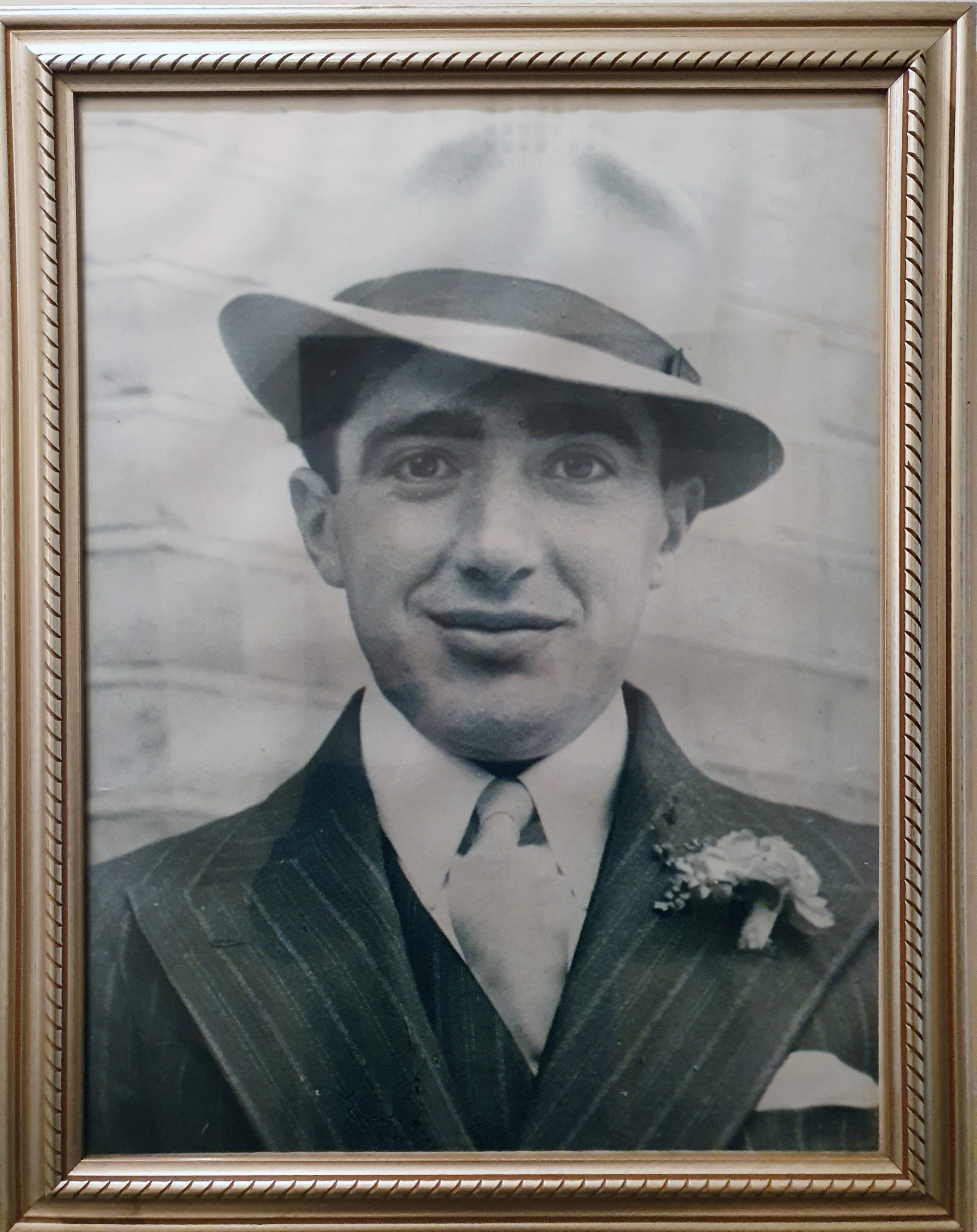
Featured Item

Hero’s words found in lost Yiddish letters
Published
2 years agoon
Harry Lipschitz grew up knowing he was named after his heroic uncle, Tzvi (Harry) Lipschitz, who fell fighting in Israel’s War of Independence. But he was never told more about his life and death, which remained a mystery until he uncovered a trove of long-forgotten letters written by his late uncle in Yiddish to his family back in South Africa.
“When my parents passed away, all their documents were kept at my niece’s home. About two years ago, she was tidying the storage unit and uncovered 108 letters, all written in Yiddish, by Tzvi to his mother, Frume Alte Lipschitz, while he was in Israel,” says Lipschitz, whose Hebrew name is Tzvi.
“The newly discovered letters have unlocked parts of history for a family and a kibbutz in Israel,” says an emotional Lipschitz. “These letters are from a young man who wrote to his mother and family on a weekly basis. He emigrated from South Africa to assist in building the fledgling nation of Israel. In his dedication to seeing that the state of Israel became a reality, Tzvi paid the ultimate price when all 300 residents of the kibbutz were slaughtered, even those that tried to surrender. It is thought that this massacre was one of the factors that prompted Ben Gurion to make his declaration on the formation of the state of Israel the following day.
“The discovery of letters not seen for 75 years means we uncovered a link to our past that we never knew existed. As children growing up, we asked our bobbas, zaidas, parents, aunts, and uncles to tell us the story of what happened to our uncle, Tzvi, but the subject was taboo. The adults clammed up, and all we were told was that Tzvi fell heroically in defence of Israel.
“The letters prompted me to begin in-depth research into what actually occurred at Kfar Etzion,” he says. “It revealed, to my horror, that when the kibbutz was overrun, all the inhabitants were killed and mutilated beyond recognition. Their bodies lay there for 18 months before being interred in a special burial ceremony at Mt Herzl. I realised why the story was hidden for all those years. The letters have also revealed Tzvi’s deeply religious beliefs, and his talents as an orator, poet, and journalist.”
His uncle was born in 1921 in Kerson, Ukraine. “In 1925, the family moved to Jasvan, Lithuania, and 10 years later, they came to South Africa,” says Lipschitz. “Tzvi’s formal education was at a yeshiva in Lithuania and he then attended school in South Africa. Tzvi’s outspoken belief in Torah v’avodah [Torah-labour ideology] soon had him speaking at all religious or Zionist functions, and no Barmitzvah or wedding was complete without a speech from Tzvi.
“He rose to the rank of vice-chairperson of Hapoel Hamizrachi [Bnei Akiva]. The Lipschitz family were members of the Bertrams Shul, where Tzvi conducted Torah reading classes every Shabbat.” In 1945, his uncle left South Africa to help build the state of Israel. On his arrival, he was offered the position of ambassador for the fledgling state in the United States to help raise funds and recruit people to come to Israel. In his determination to build up the country from the inside, he declined the offer.
“Tzvi was also asked to attend a seminary to become a rabbi, and after a long deliberation, also declined that offer. He decided to assist with the building of Kfar Etzion,” says Lipschitz.
Meanwhile back in South Africa, Lipschitz’ late father, Jack (Yankel) Lipschitz, singlehandedly kept the Bertrams Shul going for many years in honour of his brother. “He used to send taxis to all the aged homes to ensure that they could have a minyan. My mom, Sarah, used to cater all the brochas. Eventually, members had either passed away or moved away, and the shul declined. In honour of his brother, Tzvi, my father organised that three of the Torahs were sent to the shul at Kfar Etzion, where they remain to this day.”
As for the letters, “We needed to translate them from Yiddish to English,” says Lipschitz. “I discussed this with my lifelong friend in Israel, Eileen [Zakheim] Fridman, who suggested that we scan a few letters and she would try to translate them. Her painstaking translations allowed us to uncover a treasure trove of information.”
The letters are filled with enquiries about home, family, and shul, discussions about the fledging state of Israel, and animated stories. In one letter dated 7 June 1947, Lipschitz tells a wonderful anecdote that captures the highs and lows of that time, when Israel represented hope for the future. “This week, one of the bachelors got married, that is, one of the older boys of the kibbutz. He is a quiet and well-read person. There was something mysterious about him. Two years ago, he left Poland for eretz Israel. There, he left a bride. This wasn’t just a bride. This was a love. Maybe a childhood love. He arrived in eretz, and worked and waited for her arrival.
“A year passed and then two, three, and four years, and then the war broke out, she was lost, and he didn’t hear from her for a long time. Three years later, [after] he didn’t hear from her, and it became known what happened to Polish Jews, he received a letter from her from Siberia. Thank G-d she is alive! How do they get together, how do you get out of Russia? His heart was burning full of love and hope. Something must happen so that they can end their lives together. Miracles really did happen. After 12 years of waiting, she arrived in eretz Israel and even legally. After a week of being with us, the kibbutz arranged a huge wedding and handed over their oldest member. The guests were dancing, singing, and blessing the couple with mazal and children because they are both in their fifth decade (mid-forties). Let’s hope for simchas.”
Fast forward to the present, and the Lipschitz family approached the museum at Kfar Etzion to see if it would be the custodian of the letters. “But it felt that the letters should be archived and displayed at the National Library of Israel. The head of archives, Matan Barzilai, saw their historic importance, and offered that the letters and their translations be placed on display at the National Library. Eileen has professionally and diligently managed to translate more than 80 of these letters to date. They have now been transferred to the National Library, and they may form a book in the future with the title, Letters to my mother [A brievele tzu der mammen].”
The story comes full circle in an extraordinary way. “When my eldest son, Warren, went on ulpan to Israel, they were assigned to spend a few weeks on a kibbutz,” says Lipschitz. “On arriving at the kibbutz, Warren was asked how he was related to Tzvi Harry Lipschitz. Warren replied, ‘That’s my father.’ They said that that couldn’t be as this Tzvi Harry Lipschitz had fallen in defence of that kibbutz. They took him outside to show him the memorial to all the fallen. Warren ended up on the kibbutz where his great uncle, Tzvi, had fallen. Hashem works in wondrous ways.”











Trevor Pogroske
Nov 4, 2021 at 2:49 pm
Fantastic story, commendable effort by Harry and Eileen to commemorate Tzvi’s legacy.
Harry is my cousin and Eileen was my next door neighbour in Johannesburg.
It is indeed sad that the older generation never shared the stories of their tragedies and challenges because of the pain and heartache the memories brought back.
Leon lipschitz
Nov 5, 2021 at 12:34 pm
Incredible
Thank you for sharing
More background to our family.history
Paula Seligman
Nov 10, 2021 at 2:40 pm
What an amazing history you’ve been fortunate enough to discover. My Dad, Meier Gidish z.l came from Lithuania to South Africa at the age of 16. He hardly spoke about his wretched life there.
He bought S&S Trading in Johannesburg and when he saw the “writing on the wall” we moved to Springs, where he ran a most successful engineering company, Delmas Engineering.
I grew up in Forest Town and Mike knew Leo? Lipschitz, where we went to swim in the summer.
My husband, Norman is the CEO of the SJM.
Regards
Paula
Harry Lipschitz
Nov 15, 2021 at 4:21 pm
Trevor, many thanks for your message.
Of course yes, Eileen lived a few doors away from you.
You are so correct, our grandparents and parents never told us major portions of our history and like my situation, it took 75 years old letters to discover the true story.
My best wishes, your cuz in SA
Harry Lipschitz
Nov 15, 2021 at 4:24 pm
Paula, many thanks for your comments.
I think every Jewish family in SA has a similar background story.
My best wishes,
Harry